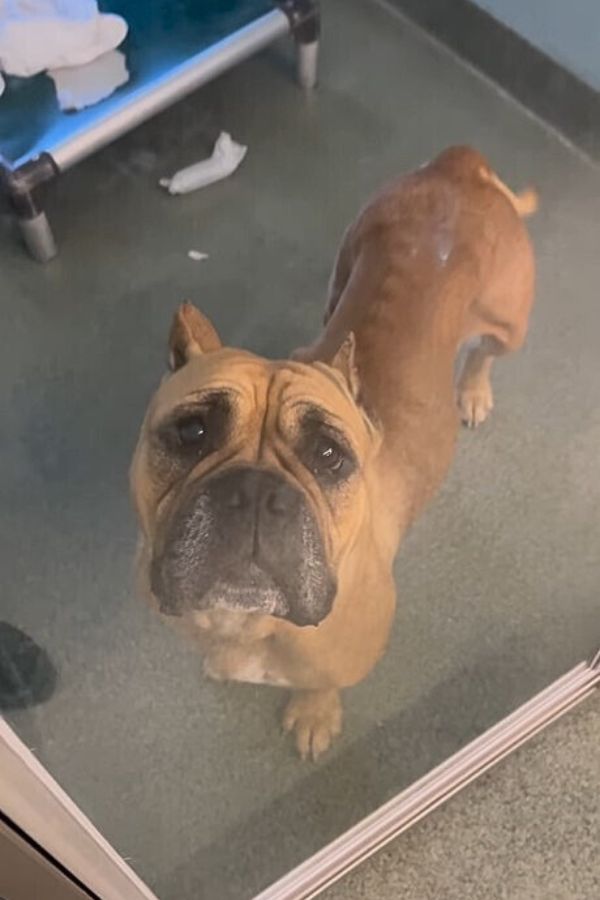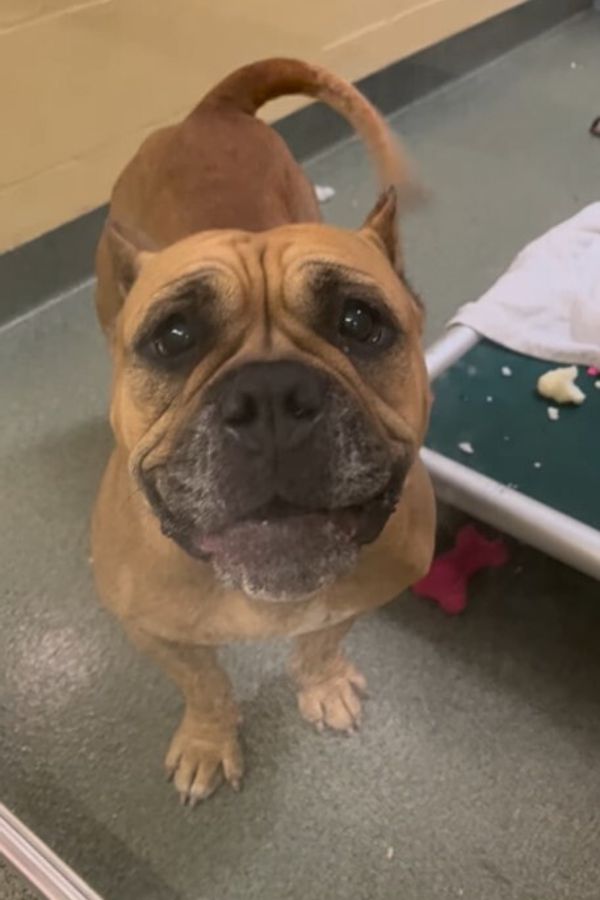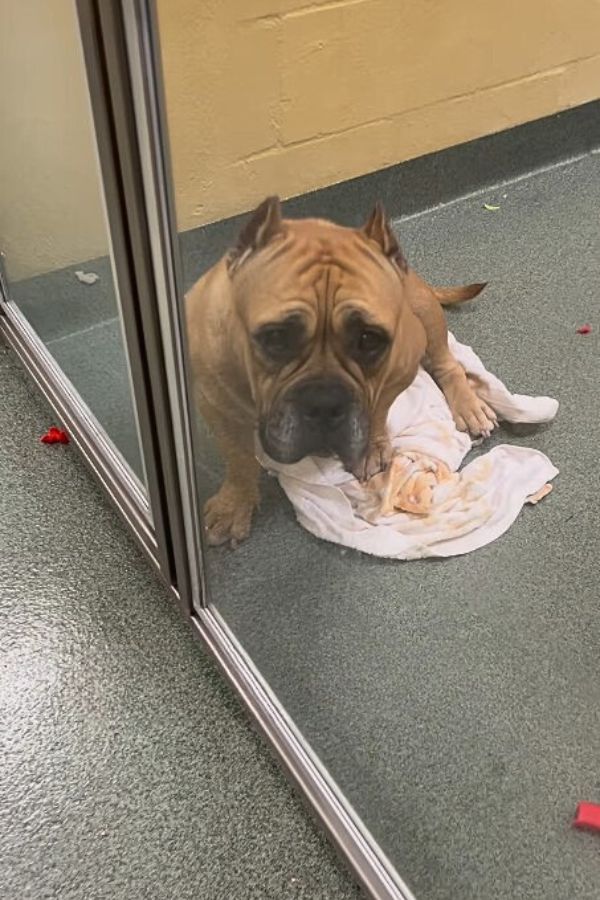All that a sweet pup named Kelly ever wanted was love, but what she received instead was rejection.
Kelly’s previous owner was a cruel breeder who used her to make a profit and dumped her when they no longer found her useful.
Sorrowful and starved, the pup roamed the streets in search of compassion and love.
While she dragged her paws around the lonely streets, the pup kept hoping that someone would notice her and offer her help.
Although she was badly treated by her owners, Kelly still believed that good humans existed.
Kelly Arrives At The Shelter

The rescuers at the Humane Society of Broward County, based in Fort Lauderdale, Florida, jumped to her rescue as soon as they spotted her in the streets.
Their hearts broke after they saw how malnourished and neglected the pup was.
Upon her arrival at the shelter, Kelly charmed the staffers with her adorable personality. The doggo was hungry for love, and she enjoyed getting cuddles from her new friends.
“Kelly is an absolute love bug and enjoys being with people and getting affection. She is goofy and likes to play with chew toys and go for walks,” Susan Leonti, the digital marketing specialist at the Humane Society of Broward County told Newsweek.
The staffers wished to help Kelly find a home as soon as possible. After everything she went through, her shelter friends knew that the pooch needed to move into a loving home in order to experience true happiness.
The shelter posted Kelly’s video, telling the story of her past life on their social media. The footage showed a hopeful pup standing in her kennel and wagging her tail.

A wonderful couple who wanted to adopt their first dog together saw the video and fell in love with Kelly.
The next day, they arrived at the Florida shelter, saying that Kelly stole their hearts and that they couldn’t wait to take her home.
The Short-Lived Happiness

Thinking that their girl had found her happiness, the shelter staff felt overjoyed.
On her adoption day, Kelly couldn’t contain her excitement. Her face was beaming. She ran to her shelter friends and said goodbye to them.
Her new parents took her home, wishing to make her happy and give her all their love, but sadly, it wasn’t meant to be.
Shortly after bringing Kelly home, the adopters found out that one of them was allergic to dogs. Sadly, the couple had no other option but to return the pup to the shelter.

Kelly got a glimpse of what happiness felt like, and it was taken away from her.
After she found herself behind the kennel bars once again, the doggo felt brokenhearted.
“Since being returned, Kelly has had such a sad and worried look on her face. When we walk by her kennel, she cries out to us and has a look of desperation in her eyes. It is simply heartbreaking to see,” Leonti added.
Although she loves her shelter friends and appreciates their affection, Kelly needs her own humans.
The pup dreams of experiencing true love for the first time in her life.
I hope that Kelly’s dream will soon come true. The affectionate pup deserves to find parents who will dote on her and make her happy.
If you’ve ever given your furry friend a rawhide chew, you might want to rethink that choice. As a seasoned dog trainer, I’ve seen firsthand the potential dangers lurking beneath those seemingly innocent treats. Rawhide, often marketed as a canine delight, can actually pose risks to your beloved pup’s health. You wouldn’t want to unknowingly put your loyal companion in harm’s way, would you?
Before you toss another rawhide to your dog, it’s crucial to understand what makes it a controversial chew option. While it may keep your pet occupied for a while, there’s more to the story than meets the eye. Your dog’s well-being is paramount, and being aware of the potential drawbacks of rawhide is key to ensuring their safety and happiness.
Understanding Rawhide: What Is It?
The Production Process of Rawhide
Rawhide is made from the inner layer of cow or horse hides. The production process involves cleaning the hide, removing hair, and then cutting or grinding it into shapes suitable for dog chews. These shapes are often treated with chemicals like bleach or other artificial flavors to make them more appealing to pets.
Common Rawhide Products in the Market
Rawhide comes in various forms such as bones, twists, sticks, chips, or rolls. These products are marketed as dental chews or treats for dogs. However, it’s essential to note that these treats may pose a choking hazard or lead to digestive issues in some dogs due to their hard and indigestible nature.
Remember, always supervise your furry friend while they enjoy treats and consult with your veterinarian about safer alternatives to rawhide chews for your dog’s well-being.
The Risks of Giving Rawhide to Dogs
Choking Hazards and Digestive Blockages
Rawhide chews, despite being popular treats for dogs, can pose serious risks such as choking and digestive blockages. The tough and indigestible nature of rawhide can lead to chunks breaking off and potentially causing choking if swallowed whole. Moreover, these pieces might create blockages in the digestive tract, requiring immediate veterinary intervention.
Chemical Contamination and Health Risks
Another significant concern with rawhide is the potential for chemical contamination. The processing methods used in making rawhide treats often involve the use of chemicals like bleach to achieve the white color and remove hair. These chemicals can be harmful if ingested by your furry friend, leading to various health issues, including gastrointestinal distress and toxicity.
The Issue of Digestibility
One of the fundamental problems with rawhide treats is their poor digestibility. Dogs’ digestive systems are not designed to break down rawhide efficiently, which can result in stomach irritation, vomiting, and diarrhea. This lack of digestibility not only impacts your dog’s immediate well-being but can also lead to long-term digestive issues if rawhide is consumed regularly.
Giving rawhide chews to your dog can expose them to risks such as choking hazards, digestive blockages, chemical contamination, and poor digestibility. It’s crucial to prioritize your furry companion’s safety by opting for safer and more digestible alternatives for their treats. Consulting with your veterinarian about suitable chew options can help you ensure your dog’s well-being and enjoyment without compromising their health.
Alternatives to Rawhide for Dogs
Safe Chewing Toys and Treats
When choosing alternatives to rawhide for your dog, opt for safe chewing toys and treats made from durable and non-toxic materials. Look for toys specifically designed for chewing to provide your furry friend with a safe and entertaining way to satisfy their natural urge to chew. These toys come in various shapes and sizes to cater to different breeds and chewing styles, promoting dental health and overall well-being.
Natural and Digestible Chews
Consider natural and digestible chews as a healthier substitute for rawhide. Options such as bully sticks, tendon chews, and raw bones provide a safer alternative for your dog to enjoy. These chews are easily digestible, reducing the risk of digestive issues and offering a nutritional boost. Natural chews are often free from artificial additives and chemicals, ensuring a safer chewing experience for your beloved pet.
How to Keep Your Dog Safe While Chewing
Tips on Choosing the Right Chewables
When selecting chew toys or treats for your furry friend, opt for safe alternatives to rawhide to ensure their safety. Look for products made from non-toxic materials to avoid potential health risks. Natural options like bully sticks, tendon chews, and raw bones are great choices as they are more digestible, reducing the likelihood of digestive problems. Prioritize your dog’s health by picking chews that provide both entertainment and nutritional benefits.
Monitoring Your Dog’s Chewing Habits
It’s essential to keep an eye on your dog while they are chewing to prevent any accidents or health issues. Regularly monitor their chewing habits to ensure they are not consuming the chew item too quickly, which can lead to choking or gastrointestinal blockages. If you notice your dog trying to swallow large pieces or showing signs of distress while chewing, intervene immediately. Supervising their chewing sessions can help avoid potential risks and keep your pet safe.
Remember, choosing the right chewables and monitoring your dog’s chewing behavior are key steps in ensuring their well-being during chewing time. By being attentive and proactive, you can create a safe and enjoyable chewing experience for your beloved companion.
Conclusion
So, there you have it – the lowdown on why rawhide isn’t the best choice for your furry friend. From potential choking hazards to digestive issues and even chemical concerns, it’s clear that opting for safer alternatives like bully sticks or raw bones is the way to go. Remember, keeping an eye on what your dog chews on and choosing non-toxic options can make all the difference in their safety and happiness. By making informed choices and staying vigilant, you can ensure your pup’s chewing time is both enjoyable and risk-free. So, next time you’re picking out a chew for your canine companion, think twice about reaching for that rawhide and consider their well-being above all else.
Frequently Asked Questions
Are rawhide chews safe for dogs?
Rawhide chews pose risks such as choking hazards, digestive issues, and chemical contamination. Safer alternatives like bully sticks, tendon chews, and raw bones are recommended for a healthier chewing experience.
What are the risks of giving rawhide chews to dogs?
The risks of rawhide chews include choking hazards due to swallowing large pieces, digestive blockages from indigestible rawhide, and potential contamination from chemicals used in processing.
How can I ensure my dog’s safety while giving them chewables?
Prioritize safe chewables made from non-toxic materials, monitor your dog’s chewing habits, and avoid leaving them unsupervised when chewing to prevent accidents and health issues.
What are some safer alternatives to rawhide chews?
Opt for bully sticks, tendon chews, and raw bones as safer alternatives to rawhide chews to provide your dog with a healthier chewing experience.
[no_toc]

Hey there, I’m Janet Brooks, a dog-loving student from California. I’m all about helping pups in need, especially those without homes. Me and my awesome friends work together to give shelter and love to stray dogs. Oh, and I also write blogs about dogs to share helpful info.